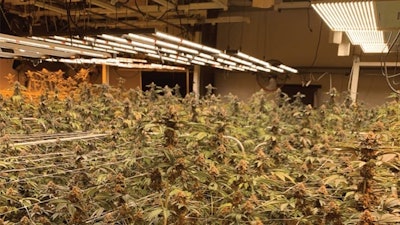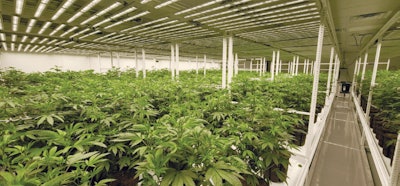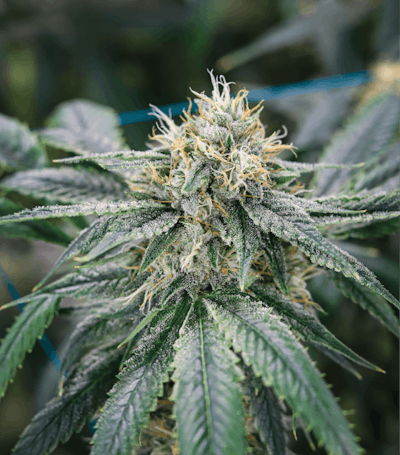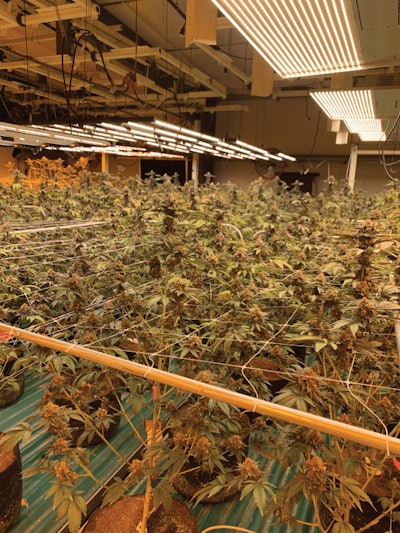

As general operations manager for Kingman, Arizona-based Evolution Pharms, Joe Rubinstein oversees every aspect of the company’s medical and adult-use cannabis cultivation operation. Whether tasks and decisions get delegated or stay with him, everything from day-to-day operations to facility retrofitting ultimately falls under Rubinstein’s purview.
Since the company began commercial cultivation under the name Green Pasture Arizona in 2016, a lot has changed. The cultivation operation rebranded and launched as Evolution Pharms in 2020. With its dual-cultivation license leased from multi-state operator Ayr Wellness, Evolution Pharms product helps supply five Ayr dispensaries operated throughout Arizona under the Oasis and the Total Health and Wellness names.
Evolution Pharms’ 3-acre property holds a 1-acre greenhouse facility with approximately 34,000 square feet of canopy and a 4,000-square-foot indoor grow room, with a second indoor grow scheduled for completion this year. As the company and the cannabis industry matured, Rubinstein realized the time for more change was here.

Evolving with Industry Standards
In early 2020, Rubinstein took stock of where the cultivation operation and cannabis cultivation technology stood.
“After three or four years of cultivating, the industry had changed quite a bit, and industry norms and standards had changed quite a bit,” he recalls. That introspection triggered the decision to retrofit Evolution Pharms’ indoor room to meet what Rubinstein considered the new indoor standard, dominated by advances in lighting, HVAC, and temperature controls.
“All of that kind of forced us to change our indoor [grow] into the modern era—sort of moving into the 21st century of cultivating indoors,” Rubinstein says. “Now, a lot more can be done on the planning side to try and mitigate some of the problems that you see cultivating.”
Evolution Pharms’ indoor retrofit included a move from standard HPS bulbs to LED fixtures—70 of them. Another major piece of the renovation puzzle involved finding the right company—a true partner—to work with for environmental controls for the indoor grow. “We were looking for an all-in-one solution that does temperature and humidity control,” Rubinstein says. That narrowed his options down to Surna Cultivation Technologies and one other company.
“We over-engineer, so everything is built for 25 to 30% over our capacity. For instance, our air conditioners are rated 30% larger than we need, so that they don’t work as hard, so they’re a little more efficient.” - Joe Rubinstein, Evolution Pharms
Partnering for Progress
While cost was a consideration in Rubinstein’s decision, he says the two competing companies were within 15% of each other, which wasn’t a huge difference in his eyes. Instead, energy savings and customer service, including factors such as parts availability, drove his decision-making process. Being able to deal directly with the manufacturer rather than a third-party distributor was important. “For me, that’s kind of a roadblock because when we have a problem, I need help now,” Rubinstein explains. Only Surna offered that direct link.
In the end, customer service won Rubinstein over. “Surna customer service attracted me more to them as a manufacturer and an installer,” he says. Included in the company’s customer service is remote monitoring, which Rubinstein says catches and corrects problems before the Evolution Pharms team even knows they exist. By the time he gets an email about an issue in the grow, units have already been adjusted to correct the problem.
“Normally, I like to tour facilities that have equipment by a particular manufacturer before I purchase it,” Rubinstein says. “I did not do that this time, and they were able to sell me without touring a facility or seeing the equipment. The first time I saw it was the day it was delivered.”
It has been about a year since the design and production process started, and Rubinstein’s glad he made that choice. About 20 weeks past installation, the retrofitted indoor grow was in its second cycle as of press time, and Rubinstein is continuing his relationship with Surna on the new indoor room.
“Their system, by all means, is excellent. It manages temperature and humidity down to 1 or 2 degrees, which is difficult for us in Kingman because our ambient temperature outside swings from 25 degrees in the winter lows to 110 degrees high in the summer,” Rubinstein says.

Preparing for the Future
Rubinstein shares that he takes steps to avoid common mistakes that new and retrofitted facilities often make—such as underestimating facility needs. “We over-engineer, so everything is built for 25 to 30% over our capacity,” he says. “For instance, our air conditioners are rated 30% larger than we need, so that they don’t work as hard, so they’re a little more efficient. Same with our lighting. Really everything that we purchase we over-engineer.”
Preventive maintenance is a priority for the company. Evolution Pharms’ cultivation operation has two dedicated maintenance technicians that work on nothing but ensuring the facility stays at peak performance. The grow’s equipment is on a weekly maintenance checklist known as the “weekly welfare check,” and Rubinstein says the grow also benefits from a yearly maintenance plan with Surna, which includes an annual on-site check on the equipment’s health.
For cultivators planning moves into 21st-century commercial cannabis cultivation—whether new or retrofitted facilities—Rubinstein recommends asking vendors a lot of questions and trying to think ahead. “Trust, but verify,” he says. “That was hard for me to do with Surna because I didn’t go anywhere to see any of their units operating. I really had to take their word for it, which I did. And so far, it’s working out well.”
Rubinstein also advises that assembling the right team for setting up your commercial grow is essential. “I consider Surna a team member because we built our cultivation around them being part of our team,” he says.


